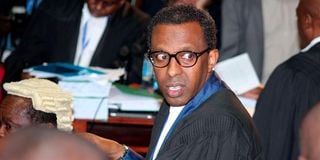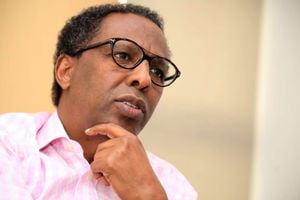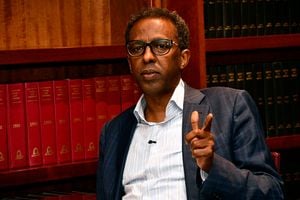
Lawyer Ahmednasir Abdullahi.
The Court of Appeal has suspended the hearing of a case challenging an indefinite ban imposed against lawyer Ahmednasir Abdullahi from appearing at the apex court, pending the determination of an appeal filed by Supreme Court judges.
The judges of the Supreme Court have challenged the powers of the High Court to determine the case.
In a ruling in June, Justice Chacha Mwita said the High Court has powers to determine the petition filed by Law Society of Kenya (LSK).
Appearing before Justices Pauline Nyamweya, Aggrey Muchelule and George Odunga on Tuesday, the parties agreed to stop the hearing of the case pending before the High Court and pursue the appeal.
“A stay of proceedings at the High Court is issued, pending the hearing and determination of the civil appeal. The hearing of the appeal shall be expedited and heard on urgent basis during this term,” Justice Nyamweya said.
The Supreme Court judges have faulted the ruling by Judge Mwita that the High Court has jurisdiction in a situation where it was being requested to review the decision of the Supreme Court.
“In the result, the decision is in direct conflict with the established hierarchy of courts in Kenya under the Constitution,” the Supreme Court said through senior counsel Kamau Karori.
The apex court maintained that the judges enjoy immunity and their decision to ban Mr Abdullahi and associates in his law firm from appearing at the Supreme Court, cannot be sued for discharging their mandate.
But Justice Mwita said it is a cardinal principle in the Constitution that a petitioner who has come to court on the basis that his rights and fundamental freedoms have been violated or infringed, should be accorded an opportunity to be heard so that the court can make an informed decision on the issue.
“In that respect, my view is that the issues raised in the petition are not idle. They fall within the ambit of Article 23 (1) 165(3)(b) of the Constitution and therefore under the jurisdiction of this court. The court has to determine whether indeed rights and fundamental rights have been violated or threatened to be violated,” said the judge.
Law Society of Kenya (LSK) challenged the ban of Mr Abdullahi and 10 associates in his law firm, from appearing before the Supreme Court.
In the appeal, the apex court said Justice Mwita erred by ignoring precedent from the Supreme Court and the Court of Appeal on the limits of the High Court’s jurisdiction.
“The learned judge erred by failing to appreciate and find that the letter and recusal order arose in the course of the Supreme Court exercising appellate jurisdiction pursuant to Article 163(4) (a) and (b) of the constitution and that for that reason, the High Court’s jurisdiction was ousted by Article 165(5)(a) of the constitution,” the Supreme Court judges said.
Through lawyer Issa Mansur, Mr Abdullahi said he will be requesting for a bench of five judges to determine the appeal.
Mr Abdullahi supported the petition stating that the pronouncement by the Supreme Court on January 18, denying him audience, was not a judicial decision but an administrative move.










